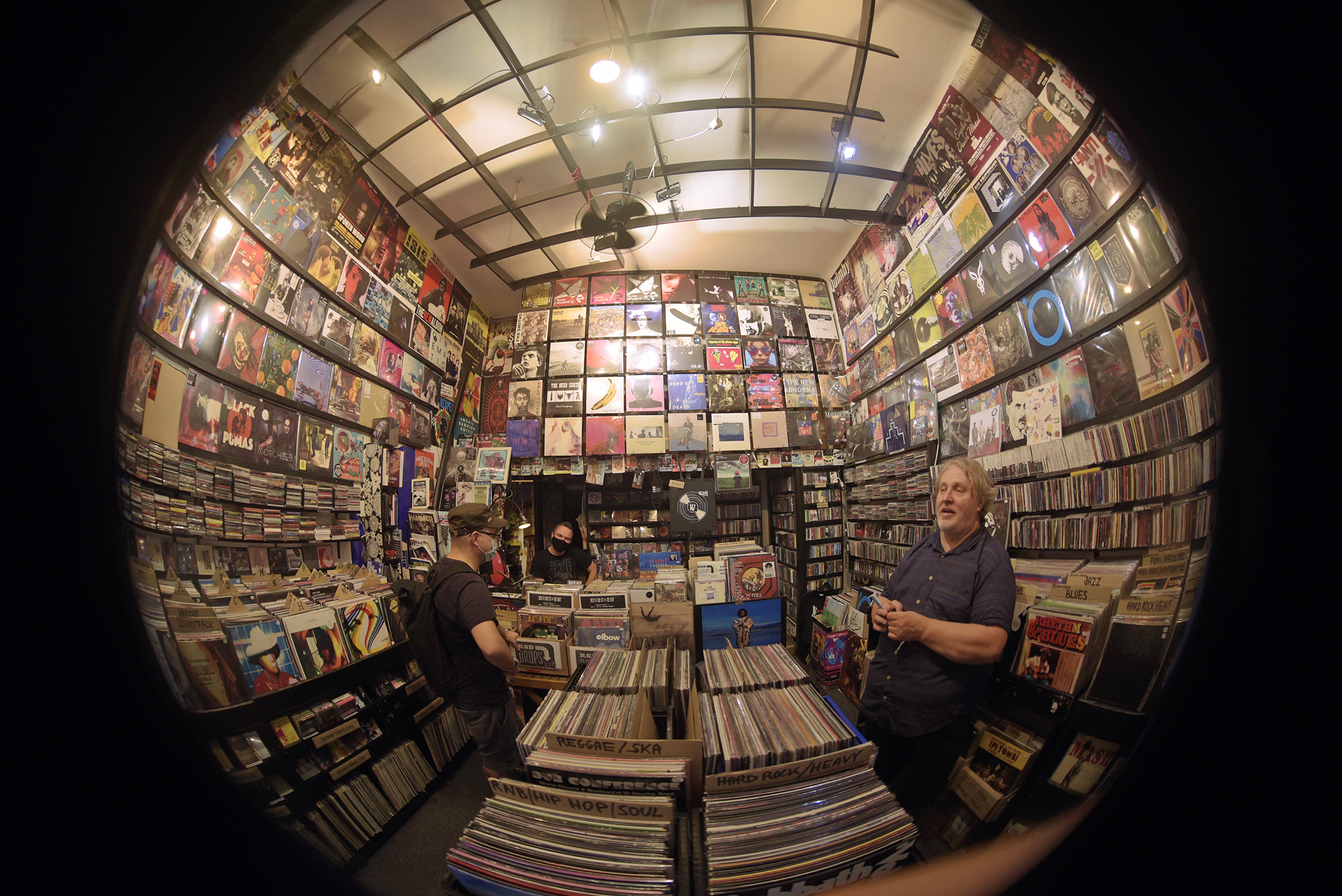Celebrating Another Hungarian Record Store Day

Photo by Péter Kósa
Budapest vinyl collectors like me have already enjoyed one Record Store Day (RSD) this year, back in April. We have another to look forward to on June 18.
RSD began in 2007 in the United States to “celebrate the culture of the independently owned record store” and spread rapidly. Today, there are RSDs on every continent except Antarctica.
The format of the day is the same worldwide: stores celebrate their place in their community by offering special vinyls, CDs and even cassettes that have been issued to mark the day. National and international stars meet and greet their fans. Stores hold fundraisers for non-profits that serve the community.
This year, the hugely popular and almost hip American singer-songwriter Taylor Swift is RSD’s global ambassador, which gives you some idea of its cachet.
In the early years, RSD was pretty much under the radar. But, after the 2016 event saw independent retailers record the highest percentage of vinyl album sales since Soundscan, the platform for tracking sales, was introduced in 1991, major labels woke up.
Since then, they’ve been criticized for hijacking the event by releasing frankly indifferent material by legendary stars and monopolizing the capacity of record-pressing plants. Other complaints include stores often being forced to buy on a no-return basis, making them nervous about stocking some releases. Many limited releases are immediately resold online by collectors at ridiculously inflated prices.
But, while those are valid complaints, for collectors, RSD remains an excellent opportunity to dig in those plastic crates stuffed with vinyl in search of their own personal holy grail or simply for albums that are irresistible even if you know absolutely zero about what’s on them.
Independent Appreciation
It’s also worth pointing out that criticisms of RSD began more than 10 years ago, and the event still goes from strength to strength, suggesting that more and more of us appreciate the place of independent record stores in our communities. That’s certainly the case in Hungary.
István Gyulai, RSD’s volunteer representative in Hungary, told me that “there’s been a visible increase in sales of vinyl since 2015. In that year, vinyl only accounted for 8% of sales. In 2021 it was 52%. Although vinyl sales in Hungary remain comparatively small (I’ve seen figures from the Association of Hungarian Record Companies that give a total of 228,000), labels and artists use RSD’s existence to shepherd fans to stores where they can buy limited releases by Hungarian bands like satirical hip-hop act Bëlga. Their limited RSD release and first-ever vinyl sold 300 copies in two hours.”
Among the other Hungarian releases were cassettes by prog-metal band At Night I Fly and composer Adam Andras Horvath (who uses no accents on his name). While I understand the return of vinyl, I admit to being baffled by the resurgence of the cassette format.
“Cassettes came back around 10 years ago, initially as part of the lo-fi scene. Independent labels love them because they’re easy to make, cheap and look good. Also, the 1980s, including its music and fashion, became cool again, as represented by the iconic TV series ‘Stranger Things,’” explained Gyulai.
“Cassettes are connected to this, but they’re mostly decoration. In Hungary, cassette culture originated back in the day because it was the only way to listen to pirated music. Also, we had radio shows in Hungary where they aired the sound of computer games for ZX Sinclair Spectrum. You could record it at home and feed it to your ZX computer. This sounds pretty crazy nowadays, I guess.”
Apart from RSD releases by local bands, “International RSD releases also go pretty fast,” Gyulai told me, “and we only have up to 10 copies of each release per store.”
Participation Spreading
In Hungary, 10 record stores officially took part this year, four more than in 2021. These were mainly in Budapest, among them Wave and Musicland, which were instrumental in launching RSD in Hungary, but they also included 777 Zenebolt in Dunaújváros (75 km south of the capital) and Néma Papagáj in Szeged (176 km southeast).
“There was a really nice level of interest in the first Hungarian RSD of 2022 on April 23. People queued up outside some shops before they opened to make sure they got their hands on limited RSD releases. We also had DJs, acoustic performances, even a cocktail party,” Gyulai says.
Although Hungarian RSD also received a boost when it was picked up by the state-owned news agency MTI and mentioned on national TV this year, for Gyulai, it’s mostly a labor of love.
“Before RSD, stores were doing things independently. I’m involved because I want to keep RSD alive locally. I’m co-owner of a boutique record label called Klinik that specializes in Hungarian, independent releases,” he explains.
“I love record stores and I love records, so I just put a little effort into supporting the day. That means connecting labels and artists with stores, gathering the information necessary to maintain a website and social media presence, helping to organize in-store RSD appearances, doing a bit of press like this and anything else that needs to be done.”
He adds that the plan is to elevate the event by reaching out to larger audiences. “Lots of people in Hungary have no idea that RSD exists and many of them are potential buyers and participants.”
You can find out more about the second Hungarian RSD at the Hungarian-language website www.recordstoreday.hu. You could pick up a Keith Richards cassette, Miles Davis and Pearl Jam live albums, a Peter Gabriel triple LP or a Prince double. Stores will also probably organize special events. Even if you’re not an especially rabid crate-digger, visiting one of the participating stores on June 18 is a great excuse to check out a Budapest neighborhood you may never have visited before.
This article was first published in the Budapest Business Journal print issue of May 20, 2022.
SUPPORT THE BUDAPEST BUSINESS JOURNAL
Producing journalism that is worthy of the name is a costly business. For 27 years, the publishers, editors and reporters of the Budapest Business Journal have striven to bring you business news that works, information that you can trust, that is factual, accurate and presented without fear or favor.
Newspaper organizations across the globe have struggled to find a business model that allows them to continue to excel, without compromising their ability to perform. Most recently, some have experimented with the idea of involving their most important stakeholders, their readers.
We would like to offer that same opportunity to our readers. We would like to invite you to help us deliver the quality business journalism you require. Hit our Support the BBJ button and you can choose the how much and how often you send us your contributions.







